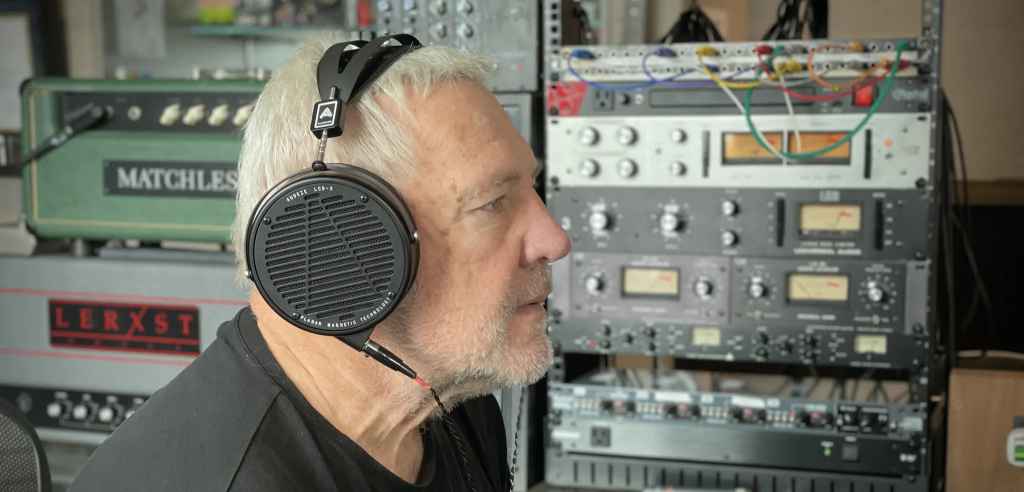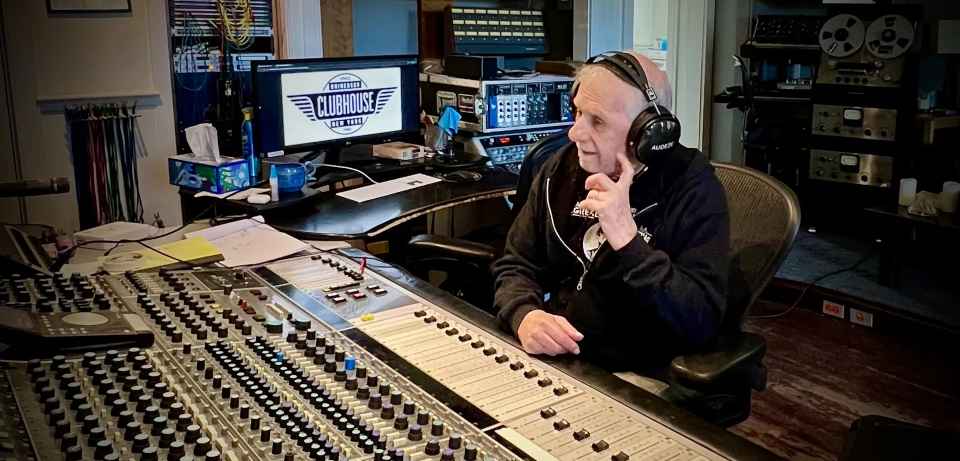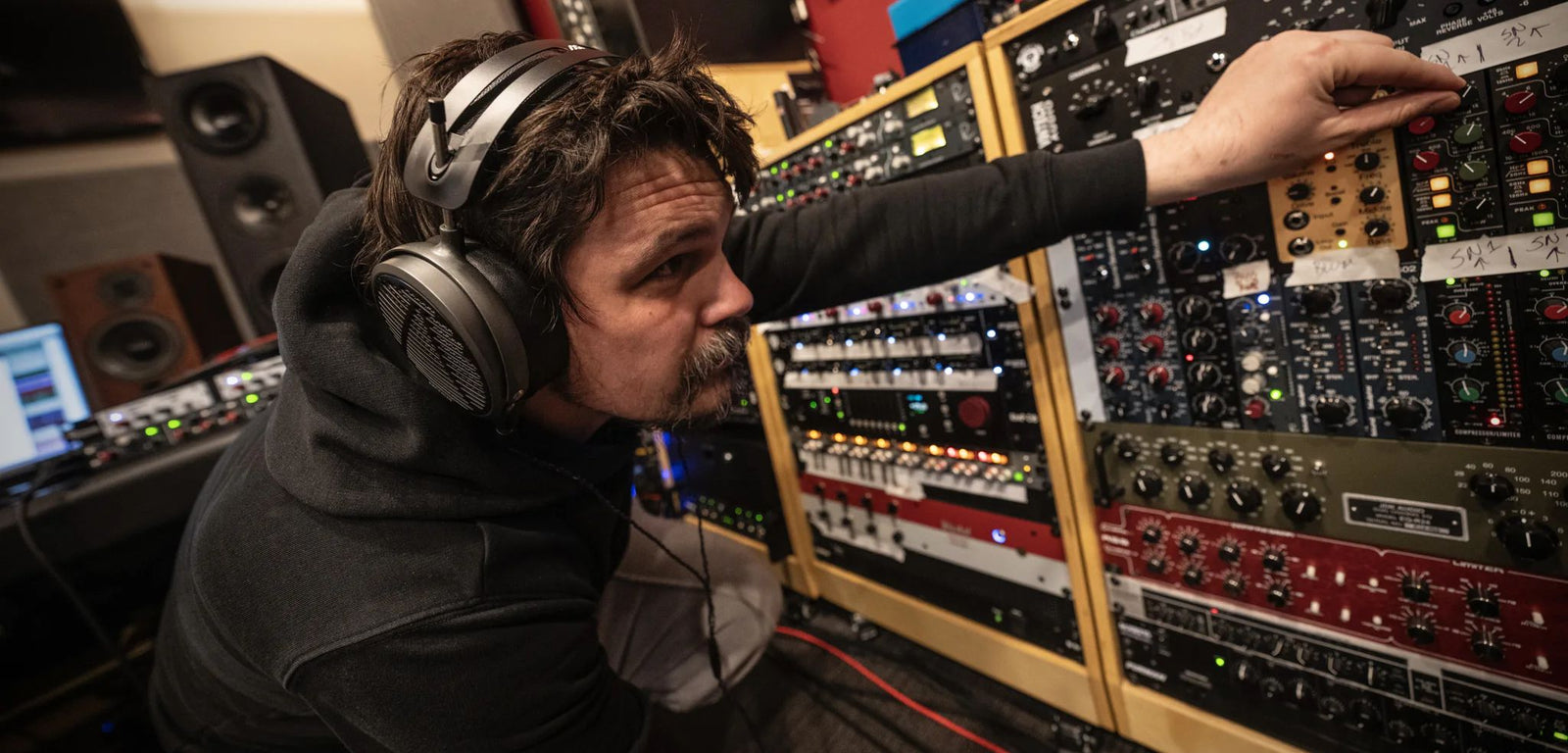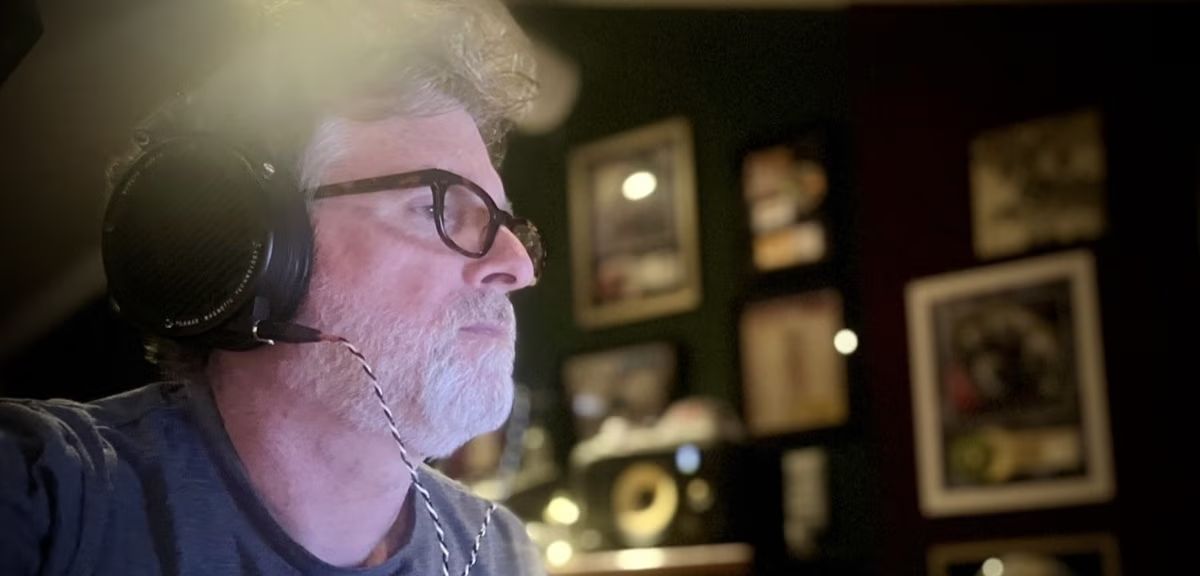
Alex Lifeson is a Canadian musician, best known as the guitarist of the Canadian rock band Rush.

Elliot Scheiner is an engineer and producer. He started working for Phil Ramone at his A&R studios which at that time was considered one of the best studios in the country.

James 'Jimmy T' Meslin is a Grammy winning recording, mix, and live sound engineer based out of Long Island, NY. He's probably best known for his work with prog-metal giants Dream Theater and their affiliated projects.

Dave Way has been mixing longer than he hasn’t. Platinum albums, No. 1 singles, 4 Grammys, 19 Billion streams with names like Michael Jackson, Fiona Apple, P!nk, Xtina Aguilera, Ringo Starr, Iron And Wine, Sheryl Crow, Marshmello, Fall Out Boy, Kesha, Macy Gray, TLC, Victoria Monet, Sons Of Anarchy, Tracy Chapman, Ben Folds, John Doe, MC5, Spice Girls, Weird Al, Paul McCartney, Bobby Brown, Mick Jagger and many, many more.
June 15, 2021
Sai Shravanam is a classically trained Music Producer, Sound Engineer, Music Collaborator and Musician who has worked exclusively within Indian Classical, Folk and Acoustic productions. He has engineered projects for some of the finest artists across the globe.

My work in the movie "Life of Pi". (Recorded the Pi's Lullaby and Additional Indian Percussions), "Strings for Peace" - Sharon Isbin & Ustad Amjad Ali Khan & Sons. All my performances in soundtracks for the legendary composer A.R. Rahman who is my greatest inspiration.
Most of the artists see me as a “catalyst” who can translate musical ideas sonically. This is the advantage of being a Musician, Arranger and a Professional Engineer. Hence in most of the projects, I am involved right from ideation, execution and post-production. "Music Producer/Recording, Mixing & Mastering Engineer" (You can read more in-depth about Sai's work in this article from Sound On Sound magazine.)
I am self-taught in both music and sound. I didn't have any formal training from a teacher or school. "My teacher has always been my ear." I was drawn to the Indian Percussion "Tabla" at a very early age. I was greatly inspired by a TV commercial that features the legendary musician Ustad Zakir Hussain. His cassettes were my self-assumed mentor. Over time I spread my interests in Music Arrangement which initiated me to understand melody and harmony. In my earlier days I was greatly inspired by Michael Jackson, Yanni, Chick Corea, Ustad Rashid Khan. Later to this was when A R Rahman's music was sweeping India like a tsunami. His music was a perfect confluence of Indian and World Music. New sounds engulfed our ears. This is when "sound" became a major part of my seeking towards art. "I see the art of sound and music as one."
Heroes: Ustad Zakir Hussain & A.R. Rahman
Role Models: Guru Karaikudi R. Mani & Chris Craker
It was my dream to even see such people at least once in my life. But all those dreams crystallised to reality and today I have had the blessing to be a part of their projects and interact with their artistry.
Moments with A. R. Rahman (Composer): I was in Washington DC performing in the Kennedy Center for the Performing Arts. I received a phone call asking me if I was willing to perform in a concert with A. R. Rahman in Singapore. I could not believe the call. Even if I could take the last flight from NY on the same day, I could barely make it for the concert in Singapore which was across the globe. I prayed for every minute to unveil itself into an hour. Sometimes you just realise that when things are meant to happen, it will all fall in place. I had a valid visa too as the earlier week I had performed in Singapore. I somehow landed in Singapore. Within hours I was on stage with a song list to perform with the band. I managed to retune my tablas for every song as I didn’t carry that many instruments, and I was unprepared for this invitation of my lifetime. I was already on stage and performing, which was when I had my first eye contact with my inspiration ARR. After the concert he looked at me and said "Nice tone, Nice playing" ... from then on, the journey continues till this date with God’s blessings. He has given me opportunity to perform in some of his finest soundtracks. To be a part of someone whom you are inspired by is the greatest blessing from the divinity of Arts. His silence and humility converses with me everyday.
Moments with Guru Karaikudi R. Mani (Percussionist): He is called the "God of Mridangam" in India. I have been producing most of his records over the last 12 years. I will tell you an incident that is mind-blowing. I was recording a solo performance of the maestro in my studio in the year 2013. He was playing a complex time signature of 9/8 on a metronome track. The solo lasted 8 minutes. It was a “perfect take”. There was a power cut in the studio during this take but the UPS took over the recording. Just after the take, across the glass, he mentioned he could not hear anything on his headphones with a subtle smile. He couldn’t hear the metronome, which went mute on his cans half way during the take. He didn't stop playing as he was in a very good creative flow. I soon realised that the UPS was not connected to the headphone amp which was recently replaced. Lo and behold, I was witnessing this “human metronome” right on the grid for minutes in my console despite him not hearing himself nor the click. His inner rhythm could out beat the machine. That was a moment when I realised that greatness of a true artiste. Metronome stood second to his fingers. No wonder he is revered as one of the best artists in the world.
Moments with Chris Craker (Music Producer - Interstellar): I had received an email from Chris in the year 2017 enquiring about Indian music recording and production. I was very excited beyond words to know of him. The very same year he had visited my studio in Chennai along with Composer Richard Harvey. My curiosity was brimming on how he had reached out to me and with hesitation I had asked him. He appreciated me for my work in the film "The Man Who Knew Infinity" for which I had produced the Indian Music. I got this opportunity from one of the finest arrangers in Hollywood, Justin Stanley. Chris gave me golden insights to myself in helping me see a larger canvas to my contribution to music industry. Being in India, I am not much exposed to large format productions like those in the West. Especially in my field of expertise - Indian classical/folk music production. He gave me the confidence to know of my strengths and ability. His humility, sensitivity, helpfulness despite his stature inspired me the most. It’s not enough if we are successful people in our industry, no matter how big & powerful the audience makes you with fame. Good traits that I see in Chris are most essential for every musician/composer/engineer who wants to be a true artist in a real sense.
Yes, there are many moments I have faced. Both technically and at a personal level. But, I have always worked my way out gracefully as it exposes what is around us and how much we learn from it.
Yes, I use an Overstayer VCA module which helps me significantly capture extreme dynamics of Indian Classical and Folk Percussion with rich texture and added harmonics. I use them generously. I ensure I maintain the dynamics of the performance yet get a rich and lush sound while capturing without distortion or clipping. My other go to is always a Neumann KM184 which suits many wind and stringed Indian instruments. It can capture natural textures beautifully, if put to use well. There are sometimes productions that just come out of one or two pieces of equipment. My recent favourite is my AUDEZE LCD-X, it is like an "opinion-maker friend" who helps me get a different perspective to my mix and helps me fine tune. In a true sense, I trust my Ear as my greatest instrument. Even if I don't have sophisticated technology, my ears help me get the desired result with an extra bit of hard work and sonic sculpting.
It's very important to remain in the realm of excellence. Do not bifurcate one work more important than the other. Every project we do teaches us something. Especially working with nothingness when we start our career. With nothingness, curiosity arises. Curiosity leads to experimentation. In turn knowledge grows. This is your greatest teacher. This path to learning opens up many unseen avenues hidden inside us. That will be your sole company for success both sonically and professionally. Do not succumb to any hardship in your career. Face your failures as opportunities to step up. Afterall, Sound and Music is a gift given to us. It cannot be purchased or possessed unless you are blessed with the ears & develop passion for it. Respect even mediocre artists & performers because they give you an opportunity to fix a lot of problems sonically and musically. This is true learning. There is not much you can do when everything is perfect from start to end. It stops us from the learning curve. Look up to everything!
Anecdote: I once mixed a very important project for an Indian Music Festival. It was sonically a very rich sounding classical production. I couldn't attend the inauguration where it premiered as I had another session that evening. I had unending calls from the composer that the audio was not that clear and many instruments were not heard the way it should. I really thought it was my best mix I could do at that point. I rushed to the theatre and witnessed the embarrassment of my own work. Later did I realise to my horror that the theatre’s CD player was connected using a Y Cable as a mono. This led to cluttering, phasing and loss of extremely panned instruments and fx. This taught me the biggest lesson on how to ensure mixes to be fairly mono compatible in the worst case scenario at the end user level. This incident gave me a new perspective to mixing. Technical explanation don’t matter to the end listener. Good music should reach the ears in its best possible avatar despite drawbacks at the end user level. That’s my Saga.
SOUND IS BOTH TECHNOLOGY & ART! DO NOT SEPARATE THEM. TECHNICIANS ARE ARTISTS. The passion, taste and commitment to design a headphone or a microphone is no lesser than a musician's passion for performance. Every engineer who creates an equipment is an artiste. If one can’t understand a singer, you can’t manufacture a stellar microphone. In fact you need to understand more intricacies of music to be a successful mixing engineer!
I started my early life in engineering using Kenwood consumer headphones. Since I did not have a professional studio then, headphones were my go to references. Even now, I have several headphones and consumer references including Airpods and Bose earbuds to see how my mixes translate to the end user. There are field recordings that I do. AUDEZE plays a huge role. The open back helps me hear the live performance but at the same time gives me a clear perception of how I capture them. Headphones are an integral part from recordings to final mastering for any professional engineer.
As I had mentioned earlier, the LCD-X is my opinion-maker friend and a critique. I have mixed on various monitors - Quested, ATC, Dynaudio, PMC, Neumann, Focal and many others over my career. I never had a pair of headphones that made me feel like a studio monitor over my ear. It was only after I heard the AUDEZE that I felt there was something to fill this void. To me, LCD-X was a very realistic reference for me. As a tabla player myself, I do not wish to hear my instrument very tailored when I hear the recorded source. Audeze was very impressive because I would record my tabla performance and immediately playback through the Audeze. It felt as if I was hearing my tabla back from my hands without exaggeration. The openness and neutrality it gave me with respect to the music I produce was exceptional. Over time, I learnt to understand the sound of my LCD-X as it takes a bit to adapt from other formats of headphones. What impresses me the most is the LOW-MID range and the TOP End. While mixing with my studio monitors I swap to the LCD-X's to check the outcome. Audeze would reveal to me all resonances or cluttering in the low-mid unsympathetically which sometimes gets unnoticed due to long hours of ear fatigue during a mix session. Nowadays, most of the end users are listening to content from online platforms on their airpods or earbuds. In fact even sound bars! The possibility of low mid clutter is very high with consumer electronics and listening environments. Audeze helps me fix this with utmost ease. The top end is very smooth. Absolutely no fatigue despite long hours of listening. I am now mixing a complete movie sound track and a Chinese-Indian Collaboration using an LCD-X because of the lockdown circumstances. I find them very trustworthy. To me this piece of Audeze innovation helps you bring the unknown best out of yourself.
1. Netrikann - Idhuvum Kadandhu Pogum
This song was for a commercial movie and at various stages of mix, audeze was involved , specifically helping me get the resonances from the strings. Checking masters on audeze helps me fix those fine elements and then there is complete satisfaction to an engineer.
2. Suryanamaskar, Indica Yoga: Rukmini Vijayakumar
This was a quick 2 hr production (music and sound was done by me) . It was just audeze. Right from creation to mixing and final master.
I was named "Shravanam" which means "to listen" by a spiritual master in India - Sai Baba. It was my Mother's wish that HE named me, which made her wait for 4 long years, until then leaving me unnamed. Today my life is engulfed with Sound. My life is "to listen." My own name inspires me to work more committed towards my service to the Art of Sound.
Not meeting my own expectations made me better and better. This journey towards excellence is so enticing. Recording and Mixing not only teaches you excellence in music, but it teaches you life. It teaches you to understand minds of artists, person-management, patience, & shows infinity as a possibility. More than all - SOUND TEACHES YOU SILENCE.
|
Sai Shravanam has produced and engineered over 300 Indian records across various genres. Notable Awards: 1. First Sound Engineer to be instituted the National Honour from the Central Government of India "Sangeet Natak Academy- Yuva Purashkar" for exceptional contribution to Indian Classical Music and Dance through Sound Recordings. 2. Recipient of the prestigious "Kalaimamani Award" - highest State Honour for contribution to Sound Recording. Artists engineered: Ustad Amjad Ali Khan, Balamurali Krishna, Mandolin Shrinivas, Vikku Vinayakaram, Bombay Jayashri, Sudha Raghunathan, Leela Samson, Alarmelvalli, Malavika Sarukkai, Debashish Bhattacharya, Ganesh-Kumaresh, Ronu Majumdar, Uday Bhawalkarm, Sharon Isbin, Mychael Danna, Justin Stanley, Mike Herting... to name a few. |